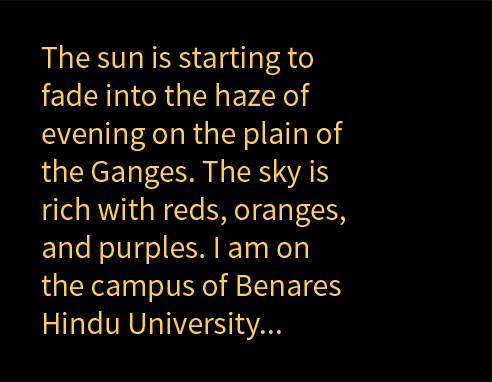|
|
The sun is starting to fade into the haze of evening on the plain of the Ganges. The sky is rich with reds, oranges, and purples. I am on the campus of Benares Hindu University, an enormous semicircle cut into sections by packed dirt roads that run out of sight in long, curving arcs. Between the roads, crumbling imperial facades abut empty lots full of weeds. Nearby, along the river’s edge, pigeons will now be coalescing and dispersing in rhythmic waves above the ghats, those long rows of stone steps that descend into the smooth, dark water of the Ganges. But in Benares, the City of Light to some and the City of Shiva, who I’ve always thought of as the god of darkness, to others, night comes sooner than you expect. I gather up my bicycle and start to pedal, passing deserted buildings and banyan trees with diminutive orange temples at their bases. I make it to the university’s entrance before I realize my mistake. Outside the gates, a mass of humanity seethes. Trucks, tuk-tuks, motorcycles and bicycles swarm the road, which is divided down its center by concrete barriers. Vendors’ stalls line the edges of this river of people. A clamor of smells – cow dung, samosas, uncatalyzed diesel fumes. A man with a megaphone shouts slogans at a throng of BJP supporters, members of the ruling Hindu nationalist party. They shout back. Achhe din aane waale hain! Good days are coming. Over it all, the dimness, the grey-and-black of dusk, leans down. Glowing headlights cast confusing shadows through the gloom. The world is brought to its knees, intimate and terrifying and much too close. In the midst of the largest crowd I have ever set foot in, I am alone. I would like to say that to enter such a crowd is to consider your own mortality, but in truth, it is to consider nothing at all – to be blinded by an appalling, adrenal panic. Seconds after I step into the fray I disappear, a stick tossed into a flood. I come up gasping for air a few feet later, my bicycle nearly torn from my hands by the front wheels of the truck behind me, which has run over my rear tire. I heave the tire free and pull myself and the bike forward, desperate to somehow break out of this enclosing terror. I head for the median, thinking that if I can perhaps reach the far side of the road I can hug the brick walls of the houses and so make my way to the side street that leads home. But to do this I must clamber over the concrete barrier and force my way through the traffic on the other side, which is headed, with the inexorable certainty of a slow-moving lava flow, back the way I came. I don’t know how it happens, but somehow, I do it. I come out on the other side shaking uncontrollably. I stumble home, I can’t ride my bike because the tire is bent, I open the metal door and fall down inside the entry hall. I have never felt more alone, smaller or more desolate than I do in this moment. My time in India was complicated. I say complicated and I mean joyous, terrifying, mundane, and sacral. I mean that, sick with E. coli, I once shat twelve times in one night, that I lay curled up in a blanket on the bathroom floor with a bucket over the sink drain to keep rats from climbing out. And I mean, more importantly, or how can I say “just as importantly” and mean that everything in India was more important than what had come before, that I often sat on the roof of my house and looked up at the hazy sunset, counting kites darting on taut strings above the city’s seemingly endless sprawl, and felt myself to be a part of all that surrounded me. The air I breathed into my lungs was made of incense and burning tires, of dust from the plains and smoke from kitchen fires, of mist and of the smoldering bodies whose ashes were swept into the river to float away on the dark, or the light, day and night, day and night. India was too much. But India, too, was not enough. I was hungry in India, famished, empty and desperate for more. I devoured brown bread with peanut butter when the bananas and kitchuri I was being fed in my sickness made me feel like I might float away into the always-smoggy sky. I drank water from earthen jugs with silver lids over their mouths, jugs kept in the cool darkness of the pantry where quiet days and quieter nights passed, uncounted. They made me think of household gods. I lived and studied in Benares, or Varanasi, a northern Indian city of many names, for a span of four months in the midst of a gap year. As a component of my study abroad experience, each student in my program was placed into the home of a separate Hindu family. The household of which I was a part consisted of an eight-year-old girl, Riti, a two-year-old boy, Ragav (called Babu-ji or baby) a mother and father, Pita-ji and Didi, and a paternal grandmother, Mata-ji. “Ji” is an honorific which can be used sincerely, as with Mata-ji (honored mother), or in loving jest, as with Babu-ji (honored baby). I lived downstairs, on the first floor, with two American students from different exchange programs in rooms on either side of my own. The family lived on the second floor, separated from us by a red metal gate at the top of the stairs with a latch on the upstairs side. I could reach through the metal latticework of the gate and undo the latch if I needed to fill my water in the middle of the night, or if I found it was closed to prevent Babu-ji from falling down the stairs. But I could never quite shake the feeling that I was welcome only to a point, beyond which implicit boundaries warded against my intrusion. The small actions of daily life – Riti doing her homework at the kitchen table, Didi cooking dinner with henna paste in her hair, Mata-ji wrapped in an orange sari, dangling her feet from the day bed in the dining room – these were somehow off limits to me. I once resolved to make cookies for my family, a task whose Herculean proportions I had not considered when I embarked upon it. Chocolate chips, vanilla, baking soda, brown sugar – these things are almost impossible to find in India, and, as I would learn, certainly not available at any of the stalls that lined the street near our house. I found baking soda in a drugstore, brown sugar, or something like it, on the dusty top shelf of a local grocery. The chocolate chips I asked my mother to mail from the States. I gave up on the vanilla. Eggs and butter I found only by accosting a street vendor making scrambled eggs and asking him to sell me some of his ingredients. These products were unavailable in my high-caste Brahmin household, where “pure-veg” only was the rule. Once I had assembled all the ingredients I could find, Didi opened a locked door across the hall from my room and moved aside piles of broken metal cookware, which would have been bad luck to throw away, revealing a dusty cooktop. Riti was thrilled to help me make the cookies, cracking the eggs and mixing the batter enthusiastically. Lacking an oven, I fried the dough on the stovetop, Riti popping her head in every few minutes to ask, “are they done?” When the “cookies” were finished, I brought a plate upstairs to offer the family and the other exchange students sitting at the dining room table. Didi and Pita-ji took a few on a napkin into their room. Riti munched away approvingly. But when my host grandmother Mata-ji entered the room and saw the plate on the table, her face turned cold and she and choked out a single word. Jao! Get out. Confused, I started to leave. As I did, she turned back to me. Aur unhen apane saath le jao. And take those with you. One of the other exchange students came down the stairs with me. “Didn’t you know this would happen?” she asked. I shook my head dumbly. “They’re Brahmins,” she said. “For them to eat any animal product, to even have it in the house, is polluting.” I can’t believe you didn’t know that, her tone seemed to say. I had known, in fact, but I hadn’t understood. I hadn’t understood why there was a second kitchen in the house. I hadn’t understood why Riti was so excited about the cookies, why Didi and Pita-ji were so furtive, why Mata-ji was so angry. How deeply a taboo can shape the soul – above all, this I had not understood. In my household, I often thought that the person with whom I shared the most was Babu-ji. Our experiences were different, certainly: I was situated on the edge of the community, Babu-ji, at its center. I was an 18-year-old American, Babu-ji, a two-year-old Brahmin. But I like to imagine that we both knew the feeling of participating in a world that was almost entirely unfamiliar, of not knowing what, like making cookies or peeing on the floor, might elicit fierce disapproval. And it was my belief that we both longed for connection and a sense of belonging at the same time as we lived in worlds of our own, worlds where the meanings we ascribed to our actions were never guaranteed to be the same as the meanings the community assigned to them. Once, at bedtime, Babu-ji kept trying to break out of Didi’s arms and run to my chair. He was making Didi angrier and angrier, setting the stage for a ferocious spanking, until I got up, took him from her arms, and gave him a hug. His little arms reached around my shoulders and a big smile lit up his chubby face. Didi laughed. And in a brief and transitory moment, there it was – mutual understanding. In India, I lived in a city of muddled-up dualities. Sacred cows so emaciated you could count each rib. Holy rivers black with human waste. Heavy incense masking the smell of burning bodies. It was not unusual, in this city, to see clouds of butterflies drifting above streets densely packed with human life, or to encounter herds of water buffalo being driven down to the river through narrow alleyways. The god of my city was Shiva, who forms one third of the Hindu trinity, together with Brahma and Vishnu. He is known within Hindu tradition as “the destroyer.” But it might convey more of his nature to say that he is the god of transformation. To draw an analogy to Ovid, he is the god “of bodies changed into new forms.” Hinduism teaches that there are no endings, or to say it more clearly, that an ending contains within it the essential moment that impels a new beginning. Perhaps this is why Shiva is far and away the most venerated god of the Hindu trinity. While I lived in India, I arrived at many endings. But the overwhelming feeling I left India with was one of gratitude, of discovering everywhere new beginnings. I found, upon leaving, that I felt compelled to ask of myself: how far can you extend gratitude? Towards what, and to whom? There is an infinity of things to be grateful for. But it starts with a gust of cool air in a hot climate, with the sound of morning prayers, with a kite, dancing towards the sunset. |
|
Samuel Blair is an undergraduate student at the University of Vermont. He studies Natural History, an individually-designed major focused on close observation of the natural world and humans’ varied relationships to it. He minors in Writing. In his free time, Sam enjoys looking for (and sometimes finding) birds, reading, travelling, and cooking tasty food. |
|


